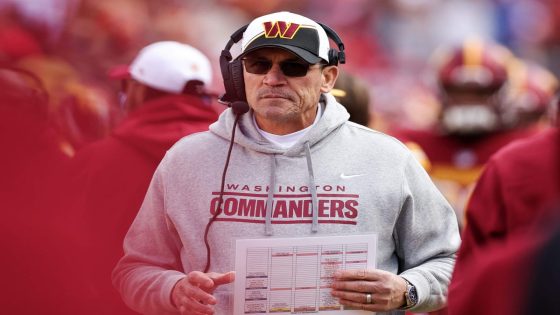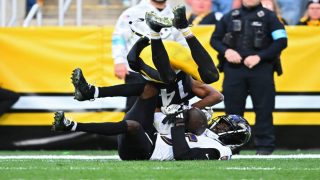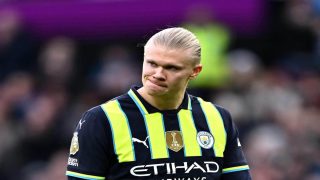In 1982, George Halas reached into Chicago Bears history to find a head coach and hired Mike Ditka.
In 2025, the team Halas founded needs to consider its history again.
There are candidates with no ties to the Bears who deserve consideration.
Foremost among them is Mike Vrabel, who never should have been fired by the Tennessee Titans and can win Super Bowls — plural — in the right situation. If Ben Johnson of the Detroit Lions is as dazzling as a head coach as he is as an offensive coordinator, he will transform an organization. His defensive counterpart in Detroit, Aaron Glenn, seems to have leadership and coaching qualities that few have. Steve Spagnuolo’s long history of building defenses and relationships may be evidence he could thrive with a second chance. The way Joe Brady has easily lifted the Buffalo Bills offense suggests he can handle more plates on the bar.
And there are others. Maybe in the final analysis, one of them is best suited for the job.
However, only one person has had a football role on both Bears Super Bowl teams. Ron Rivera was a linebacker on the 1985 champions. On the 2006 Bears that lost to the Indianapolis Colts, he was their defensive coordinator.
Now he should be first in line to interview.
Rivera’s 2006 defense allowed the third-fewest points in the NFL. Without justification, he was fired after that season, and the Bears took a cold plunge. In the 19 seasons since, they have made the playoffs three times and have a .439 winning percentage.
Drafted by Jim Finks, built up by Ditka and mentored by Mike Singletary, Rivera, more than any potential candidate, comprehends what it means to be a Bear. He knows where Chicago’s potholes are. He understands the organizational strengths and limitations, the fan base and the local media.
There is no doubt Halas would have endorsed interviewing Rivera. Same for Walter Payton, who sat across from Rivera on plane rides to and from games.
Ditka was not the only former Bears player to become their coach. In their first 54 years, every one of their coaches except Ralph Jones was a former player for the team. Halas himself played for the Bears. The other Bears players who became the franchise’s head coach were Luke Johnsos, Hunk Anderson, Paddy Driscoll, Jim Dooley and Abe Gibron.
The Bears have been criticized — justifiably — for not considering former Bear Jim Harbaugh as a head coaching candidate. Ignoring Rivera would be making a similar mistake.
History is not the only reason Rivera should be considered. Like Harbaugh, Rivera is a proven coaching commodity. His coaching journey began humbly as a quality control coach for his Bears in 1997. Two years later, he went to work for Andy Reid in Philadelphia as a linebackers coach before returning to Chicago to coordinate the defense in 2004.
When he was head coach of the Carolina Panthers, Rivera’s teams made it to the playoffs four times and the Super Bowl once. He was voted coach of the year twice, which makes him one of 13 to be honored more than once. Seven of the 13 are in the Pro Football Hall of Fame, with Halas and Ditka among them.
After new Panthers owner David Tepper fired him in 2019, Rivera was unemployed for less than a month when he agreed to lead Dan Snyder’s Washington Redskins, who became the Football Team and then the Commanders in Rivera’s tumultuous tenure as their coach. And he wasn’t just their coach. He was their de facto general manager. Then he became Snyder’s frontman/shield when workplace culture transgressions and financial improprieties came to light and Snyder went underground.
Rivera arguably was the most sought-after coach in the 2020 cycle. The four regrettable years he spent with Snyder, arguably the worst owner in the NFL’s history, changed perceptions. Rivera was not the first to have his reputation diminished by the association.
In his tenure with Washington before Snyder, the great Joe Gibbs won 67 percent of his games and three Super Bowls. After retiring and returning with Snyder as owner, he went 30-34. As a college coach, Steve Spurrier won 71 percent of his games and a national championship. With Snyder, he won 37 percent of his games. Mike Shanahan, who should be on his way to the Pro Football Hall of Fame, had a .598 career winning percentage and two Super Bowl rings as a head coach before partnering with Snyder. In Washington, his winning percentage was .375.
Rivera’s winning percentage before Snyder was .546, one percentage point better than Vrabel’s. In Washington, it was .396.
Some will question if a defensive-minded coach like Rivera is right for the Bears because of the presence of quarterback Caleb Williams, as if a coach without an offensive background should be disqualified. Hiring a head coach with one player in mind when 53 need to be led is an absurdity.
Tom Landry, Chuck Noll, John Madden, Don Shula, George Allen, Bill Parcells, Marv Levy, Dick Vermeil, Tony Dungy, Bill Cowher and Jimmy Johnson have busts in the Pro Football Hall of Fame. Almost assuredly on their way to Canton are Bill Belichick, John Harbaugh and Mike Tomlin. None of them had offensive backgrounds before becoming head coaches.
In 2011, when Rivera was hired in Carolina, there were similar concerns about his ability to handle an offense. With the first pick in the draft, the team chose a quarterback, Cam Newton. Rivera sent offensive coordinator Rob Chudzinski, quarterbacks coach Mike Shula and offensive quality control coach Scott Turner to Auburn to meet with the school’s offensive coordinator, Gus Malzahn, and try to understand what Malzahn did with Newton in helping him win a national championship and Heisman Trophy.
Panthers coaches implemented concepts Newton succeeded with at Auburn, including RPO plays that weren’t widely used at the time. Newton was named offensive rookie of the year. Four years later, Newton was voted the NFL’s most valuable player — while playing for a defensive-minded coach.
Rivera connects with players. He earns respect with authenticity, class and toughness. And apparently, these Bears need a coach who will hold players accountable.
The year after Newton was the league’s MVP, Rivera benched him because he refused to follow a team rule requiring players to wear ties on the plane. When Newton showed up tieless, Rivera tried to give him a tie to wear. Newton said it didn’t match his outfit. Rivera told him there would be repercussions, and Newton subsequently was held out the first series of a game. Newton later apologized to the team.
Rivera, who learned about aggressive strategies from Buddy Ryan and his Eagles defensive coordinator Jim Johnson, never has been afraid to take a chance. Before they called the head coach of the Lions Dan “Gamble,” they called Rivera “Riverboat Ron.”
In his first training camp in Washington, Rivera was diagnosed with squamous cell cancer in a lymph node. That season, he had 35 proton therapy treatments and three chemotherapy treatments. Rivera lost 25 pounds and grew so weak he had to be brought into the office with one arm around his wife’s shoulder and one around the team trainer’s. He never stopped coaching and leading, though, and his team rallied, winning five of its last seven games to make the playoffs.
Rivera eventually rang the bell and is cancer-free. For his perseverance, the Pro Football Writers of America voted him the recipient of the George Halas Award, which is given for overcoming adversity.
The significance of Rivera winning the award named after the founder of the Bears should not be lost on those entrusted with maintaining the Halas legacy.
(Top photo: Scott Taetsch / Getty Images)






